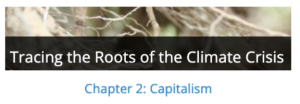5.5 Capitalism and the Climate
The capitalist economic system also has profound effects on the living systems of the world. As we live in a period of cascading ecological crises, from mass extinction (Kolbert 2016) to climate disasters, many scholars have asked how we should understand this moment. And increasingly popular answer is to call it the “anthropocene.” The anthropocene is a name given to the most recent geological epoch of time, beginning perhaps around the industrial revolution, in which humans have fundamentally transformed the living systems of the Earth.
Since the prefix “anthro” refers to humans, the name “anthropocene” identifies “humans” as the root cause of these global transformations. And yet, most humans, for most of human history, have not reordered the world in the way that we currently see. Some scholars, like the economist Raj Patel and the sociologist Jason Moore, argue that it is misleading to place the devastation caused by our current society at the feet of “humanity.” Rather than humanity itself, they argue that the root cause of these ecological crises is actually the capitalist economic system. They propose a new name for this epoch: the capitalocene—the geological epoch in which capitalism has reordered Earth systems (Patel and Moore 2018).
5.5.1 Tracing the roots of the climate crisis
To consider some of the ways our economic system relates to the ecological crisis, check out the second chapter of the podcast Tracing the Roots of the Climate Crisis, Capitalism (Figure 5.13). It is 13 minutes long.
In this podcast, Ben Cushing explores the question: Is the climate crisis, and the ecological crisis more broadly, the predictable outcome of a certain economic order? He offers a critical lens to analyze our current economic system: Who is it designed to serve? What are the consequences of an institution designed to prioritize profit over everything else? What kind of a world will such an institution create, and what kinds of human behavior is it likely to encourage? Is this kind of institution compatible with a thriving and just community? Is it compatible with a survivable future? Finally, how do we dismantle such a dangerous system? How do we build an economy that attends to the needs of human and nonhuman communities?
Ben Cushing specifically speaks to an example of Exxon, saying: “The profit motive is a powerful thing. Exxon had a choice that very few people in human history have ever had to face. They could choose, with a pretty clear understanding of the implications of their choice, between the short term profit interests of their corporation and the long term survival of their civilization and innumerable species around the world. They chose profit. Did Exxon make the right business decision?”
Maybe surprisingly, Cushing answers yes. Why does he say “yes?” What do you think?
Figure 5.13. Title of Podcast: Tracing the Roots of The Climate Crisis: Chapter 2
5.5.2 Licenses and Attributions for Capitalism and the Climate
“Capitalism and the Climate” by Ben Cushing is licensed under CC BY 4.0.
Figure 5.13. Tracing the Roots of the Climate Crisis is published on Podbean

